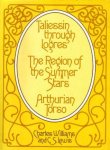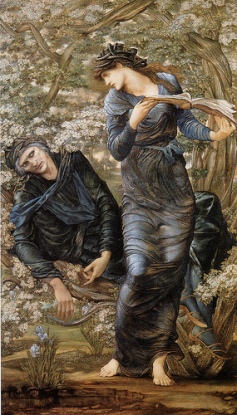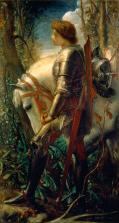 Here is Post #20 in the Series on Taliessin through Logres! Please visit the INTRODUCTION to this series first, and here is the INDEX to the other posts in the series.
Here is Post #20 in the Series on Taliessin through Logres! Please visit the INTRODUCTION to this series first, and here is the INDEX to the other posts in the series.
Today’s post is by David Russell Mosley.
 David Russell Mosley blogs at Letters from the Edge of Elfland. He has a PhD in theology from the University of Nottingham in the United Kingdom, and currently teaches theology part-time for Johnson University. Mosley is the author of the forthcoming books, On the Edge of Elfland, a faërie romance that will be published by Wipf and Stock publishers sometime this year, and Being Deified: Poetry and Fantasy on the Path to God which will be published by Fortress Press sometime this year.
David Russell Mosley blogs at Letters from the Edge of Elfland. He has a PhD in theology from the University of Nottingham in the United Kingdom, and currently teaches theology part-time for Johnson University. Mosley is the author of the forthcoming books, On the Edge of Elfland, a faërie romance that will be published by Wipf and Stock publishers sometime this year, and Being Deified: Poetry and Fantasy on the Path to God which will be published by Fortress Press sometime this year.
Here is Dr. Mosley reading “The Departure of Merlin”:
All is right with the world. Galahad, the man with a trinity of mothers and, possibly, fathers, has taken his rightful place in the Siege Perilous. The heart of mankind, in the Pope’s hands (which are the vicarious hands of Christ), beats as a lover’s heart does beat in the presence of his beloved. The heretics flee from Byzantium and the Table is taken into Broceliande. Merlin has set all to rights, and so he may now depart, or so it seems.

“The Beguiling of Merlin” by Edward Burne-Jones
I make no claim to be an expert on Charles Williams or even Arthuriana (although I know more about the latter than the former). Nevertheless, there are several things of note in this poem about the departure of Merlin that I have noticed and desire to share with you. As I said in the beginning, what we have in this poem is a Merlin whose work is done. It seems Logres has no more need of him, Palomides is a Christian, and Galahad has come (and possibly even brought the Grail). The timeline here is admittedly (as it is throughout the work) confusing.
Sørina in her introduction to Taliessin through Logres suggests that the placement of this poem indicates it takes place after the events in the poems preceding it; however, the poem itself seems to at least possibly suggest that Merlin’s departure comes after he has born Galahad to Almesbury and to his second of three mothers, Blanchefleur. The confusion, for me, stems from how we are meant to understand this stanza:
The joyous moon waxes in the chair;
the blessed young sorcerer, a boy and less than a boy,
rose and ran, turning on the roads; he span
into the heart’s simultaneity of repose.

“Sir Galahad” by George Frederic Watts
Who is this joyous moon? The moon itself would suggest Galahad (who was delivered “to a moon of white nuns”). If I am right and the moon is Galahad, further evidenced by the mention of the chair, for Galahad is the rightful owner of the Siege Perilous (the seat chosen by Merlin for the one who would achieve the Grail Quest), then it is possible to read this as saying both that Merlin’s departure comes after his deliverance of Galahad or after Galahad’s waxing. To further confuse matters are the other three verses of this stanza. Who is the young sorcerer? At first we might think Galahad, after all the first verse is about him, but Galahad is not a sorcerer and is not, yet, going to his repose. It is Merlin, not Galahad, who is departing. I think my reading is correct based on the next stanza:
Joseph of Nazareth, Joseph of Arimathea,
came dancing through the coeval-rooted world’s idea.
They saw Merlin descending: they met him in the wood,
foster-fathers of beatitude to the foster-father of Galahad;
So at some point after Galahad is delivered to his first foster-mother (his second being Guinevere and his actual mother being Helayne), Merlin departs into the wood, presumably Broceliande, and there he meets, dancing, the two Josephs of the New Testament. Here Williams does something that I find very interesting. He considers the two Josephs as foster-fathers, in different senses, of Christ (thereby giving Christ a trinity of fathers: the Father, Joseph of Nazareth, and Joseph of Arimathea). He then uses this to connect Merlin to these men as the foster-father of Galahad. This is interesting because Williams is now setting up some kind of connection between Galahad and Christ and it is this I want to primarily examine now.
It seems to me one could almost argue that Taliessin through Logres is about Galahad and his father Lancelot more than it is about anything else. It is not even a grail quest since we never properly see the grail in any one poem (perhaps intentional on Williams’ part so that it leaves us with the Quest, that we must seek out the Grail). As you read through the book, you find Lancelot several times ending an individual poem, as well as being part of the focus of the book overall. Lancelot signals the beginning of Camelot and Arthur’s rule in Logres in “The Calling of Arthur.” He signals its fall in “The Star of Percivale” when he looks to the Host and sees not Christ but Guinevere (though he is not alone at fault since Arthur sees naught but himself). And yet Lancelot performs a meaningful mass, that will be discussed later, at the very end.

Galahad by Edward Burne-Jones
Galahad too plays his part, but Galahad’s part, as the poem would argue, is the ennobling of Logres, the undoing of the sins of his father, Lancelot, and his foster-father, Arthur. Galahad’s coming does not signal the renewal of Logres as Merlin knew it:
Moons and suns that rose in rites and runes
are come away from sequence, from rules of magic;
here all is cause and all effect; the laws
of Merlin’s boyhood are unknown in Nimue’s wood.
Instead, Galahad’s actions function as a kind of transfiguration, not only of the ever dwindling Logres, which ultimate rescinds into Carbonek in Broceliande, but of Broceliande, which I think we can equate with Faërie itself, as well.
We see this as “The Departure of Merlin” comes to a close. Merlin is wandering in the woods, which I assume are the woods of Broceliande since they are called Nimuë’s wood, and he is seen by some “I,” presumably Taliessin. This I who sees Merlin in the wood then sees into P’o-Lu: a realm of anarchy headed by a headless emperor. It seems, to me at least, that Broceliande is come to P’o-Lu. The headless emperor fades, and the trees over cover the volcanic waters of this hellish place. For some reason, I don’t yet understand fully, this terrifies at least one sailor with the I, causing this sailor to jump overboard, “to the wreck of wisdom, the drowned last of love.” Perhaps the sailor is confused and believes that P’o-Lu has overcome Broceliande. Perhaps he despairs that Broceliande is withdrawing from the parts known into parts unknown. I’m not sure. What I do know is that this vision, along with a wind from Broceliande itself, sends the sailors to Byzantium.
After the strange scene we return, I believe, to Logres, to Logres withdrawing. The Table has, it seems (and this will be made more clear, though only slightly, in “Taliessin at Lancelot’s Mass”) been withdrawn into Broceliande. Nimuë draws “all natural becoming to her shape of immortal being.” Merlin, I think, is part of this, he too is drawn in to receive his repose and to become, I think, identified with time itself. Throughout the book Merlin’s age seems uncertain (though not in a T.H. White kind of way). Merlin, it seems exists almost outside of time, or better, is time. This I see in the final stanza: Merlin is done, so the stanza tells us, and has done well, for the “moon,” Galahad, Lancelot’s son, “waxes and wanes in the perilous chair.” Yet the last line tells us that Galahad is not only in his proper place, the siege perilous, nor that he is the son of Lancelot, but that he is “time’s foster-child.” Unless Williams is giving us a fourth father to Galahad (Lancelot, Merlin, Arthur, and Time), it would seem that Merlin can now, if not before as well, be identified with time itself, making the Christlikeness of Galahad clearer still since he too came at the appointed time. And it is this appointed time that sees Logres handed over to Galahad, even as it slowly withdraws, as he receives it from his three fathers, Lancelot, Merlin/Time, and Arthur.

An excellent thought to read it aloud! Thank you! (Perhaps an inspiration for a future project…!)
LikeLiked by 1 person
“It seems to me one could almost argue that Taliessin through Logres is about Galahad and his father Lancelot more than it is about anything else.” A fine observation, drawing things together and spurring on to its further exploration!
LikeLiked by 1 person
Not to distract anyone onto a tangent before discussing what you attend to here, and how, but you also got me thinking it would be interesting to compare Prospero in Shakespeare’s Tempest with Merlin here, in some respects – having actively brought things to a certain state, being able to do no more but allow them to happen further.
LikeLiked by 1 person
David, I think that’s an excellent comparison. It is interesting, and I think telling, that Williams simply has Merlin disappear. He lacks the seduction by Vivien, and so Merlin’s work is done and he simply disappears, perhaps knowing what ruin will come but what good as well. I wonder if there isn’t also a connection to the manner in which Aslan disappears having once set things in motion (of course there’s quite a difference between Aslan and Merlin) but this similarity is interesting.
LikeLike
Thanks! Yes! – your commentary brought home to me how very interesting it is that Williams simply has Merlin disappear – and at this point (whichever exact point it is)! The disappearing Aslan is an intriguing comparison I shall have to ponder over… Your saying, “Unless Williams is giving us a fourth father to Galahad (Lancelot, Merlin, Arthur, and Time)…” had already got me thinking of Narnia (and Michael Ward’s discussion of the Silver Chair draft with “the god Saturn”), and that I should think more about Merlin and time than I have (on the basis of various notes as well as this poem itself, and others).
LikeLike
Joseph of Arimathea as foster-father is rightly – and nicely – another thing you get us paying attention to and thinking about!
I love the quotation from Origen’s commentary on the Gospel of St. Matthew which Williams later includes in his anthologies of daily readings: “It was not written by hazard: ‘Joseph wrapped Christ’s body in a clean winding-sheet, and placed it in a new monument,’ and that ‘he rolled a great stone,’ because all things around the body of Jesus are clean, and new, and exceeding great.” (And, earlier, a bit of this via “St. Thomas Aquinas, Catena Aurea”: “Every thing touching the body of Jesus is clean, and new, and very great.”)
With Joseph of Arimathea in this context there seems perhaps a very subdued directing of attention to the death of Galahad (in some sense or other) which I have not begun to think about enough, but which seems to be there in this book to think about!
And what, in this context, of any possible reference to the legends of Joseph of Arimathea as Grail/Hallows-Bearer?
LikeLike
Pingback: TTL 21: “Palomides before His Christening.” — by Charles Huttar | The Oddest Inkling